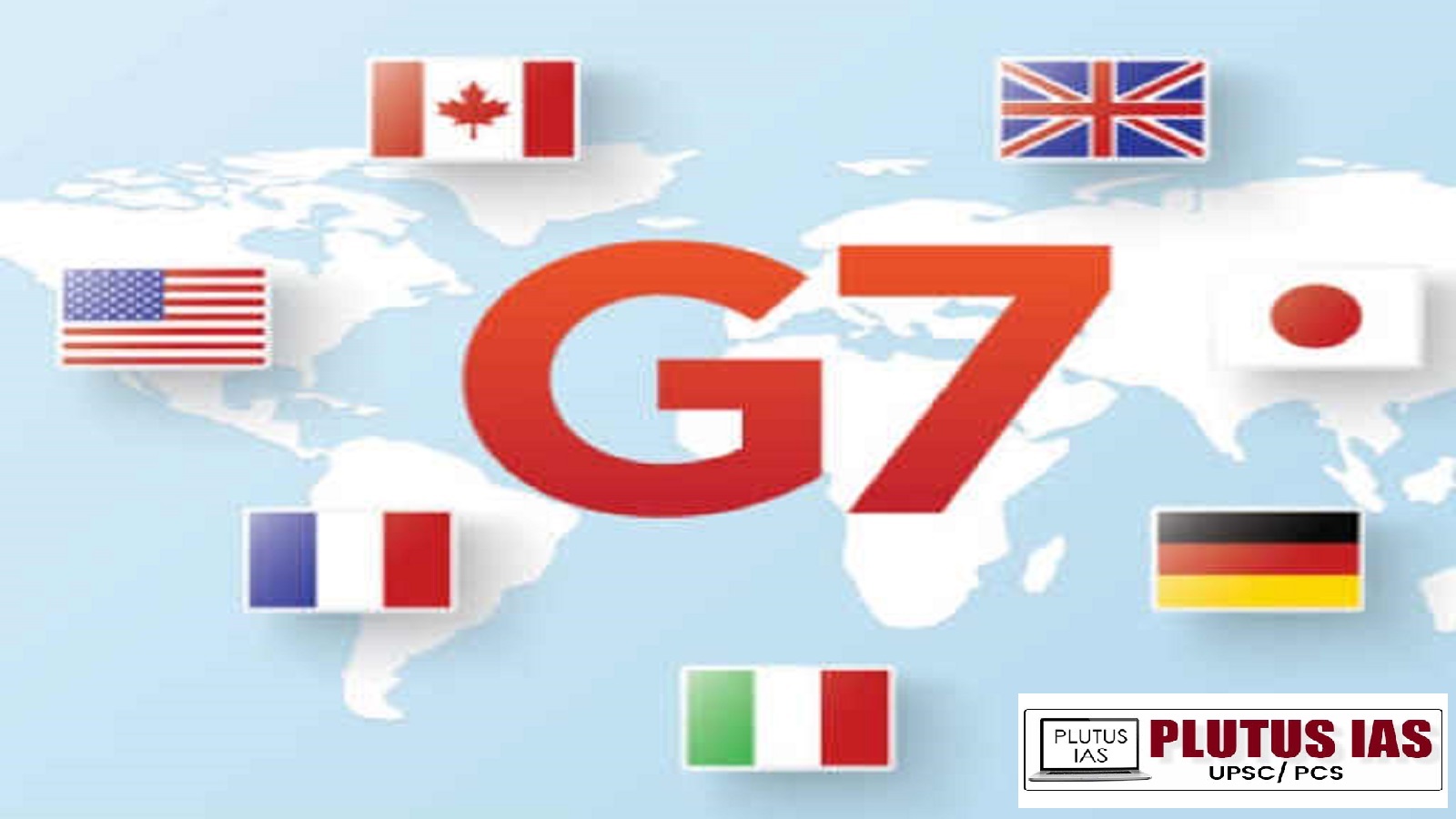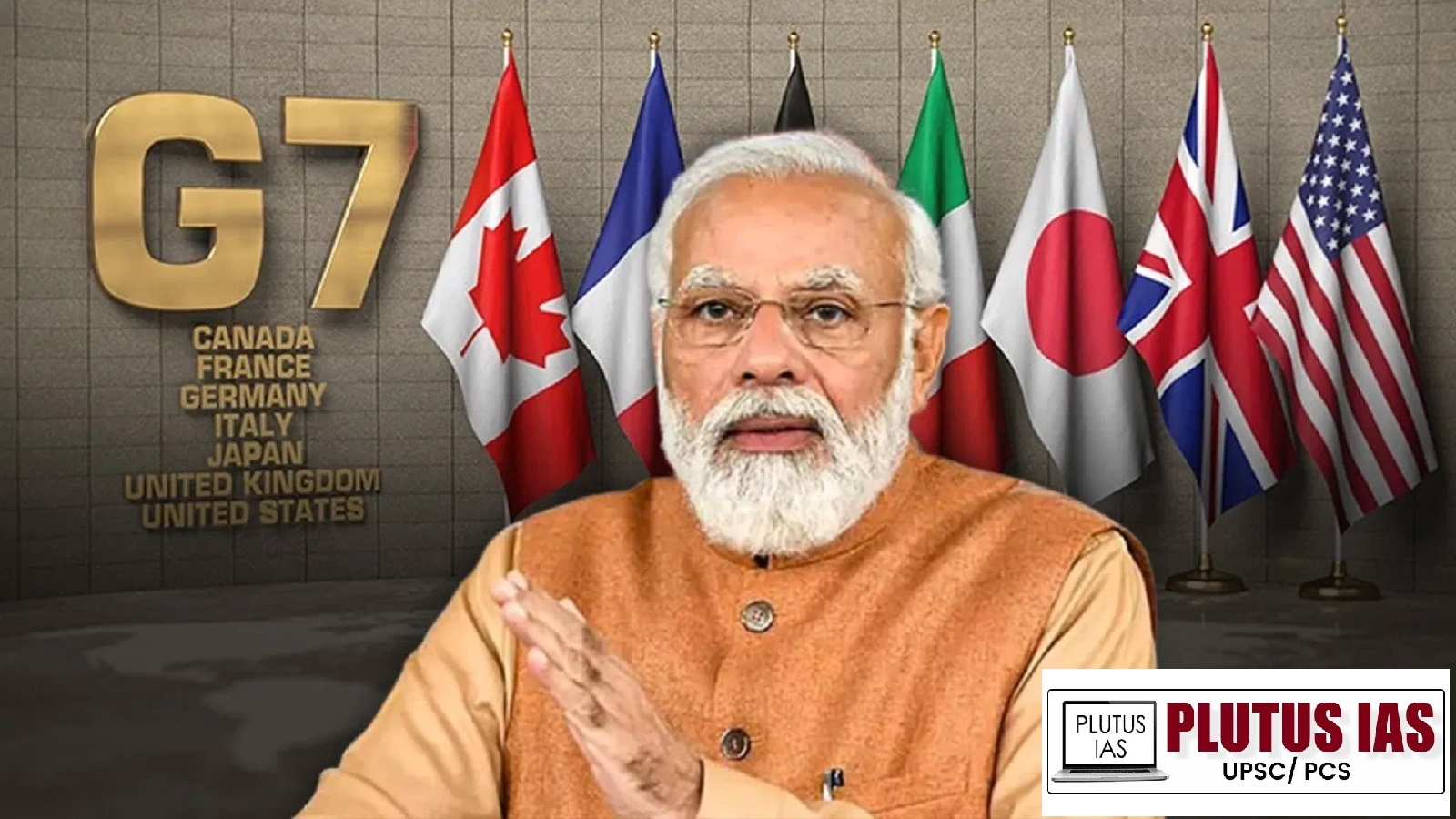18 Jun 50th summit of G7 group of countries
( This article is about UPSC Civil Services Examination Mains General Studies Question Paper – 2. Under International relations, important international institutions, Global groupings, Bilateral groupings and agreements, India’s foreign policy, importance of Quad in promoting regional cooperation, role of G7 summit in addressing global challenges, climate change and global security. relationship ‘ From section and under UPSC preliminary exam ‘ G7 Summit, Strategic Importance of Indo-Pacific Region ’ Is related to the section. It also includes suggestions from the PLUTUS IAS team. This article Is related to ‘ Daily Current Affairs ’ Under ‘50th summit of G7 group countries’ )
Why in the news ?

- Recently the Prime Minister of India participated in the G7 Summit to be held in Italy from June 13 to 15, 2024.
- This summit was organized to commemorate the 50th anniversary of the G7 group of countries.
- This was his first foreign visit after assuming the post of Prime Minister in his third term as Prime Minister of India.
- Despite not being a member of the G7, India has previously attended the G7 summits held in France, the United Kingdom, and Germany in 2019, 2021, and 2022 respectively as a guest.
Introduction and main objectives of G-7 :

- G-7 The group is one of the world’s most developed and advanced economies.international groups and It is an informal forum.
- Canada, France, Germany, Italy, Japan, United States and United States (UK) include, as well as the European Union (EU) is also considered as a ‘non-listed member’ of this group.
- G-7 main objective of global problems especially economic issues There has to be discussion and sometimes coordinated action.
- G-7 Was established in the 1970s.
- Initially with the 6 major industrialized countries, and in 1976 Canada After joining this G-7 was formed.
- Russia upon joining in 1998 G-7 ‘G-8’ was changed to , but in 2014 Crimea in response to the capture of Russia By expelling him from this group G-7 Changed again.
- G-7 The summit is held every year, with each member country of the group hosting it in turn.
Format of G-7 :
- Informal groups : The G-7 is a group that is not covered by any formal treaty and has no permanent administrative structure. Each member country (hosting the conference) takes turns conducting the meetings.
- Unanimous decision : The effectiveness of the G-7 is driven by the economic and political dominance of its members, and the influence they can exert globally through consensual support on key issues.
- Limited legal power : The G-7 cannot directly introduce any legislation, but its proposals and coordinated actions can have a significant impact in international forums, and can be important in shaping major initiatives on world-level issues
Key points related to the 50th G7 Summit :
- Leaders of various countries participating in the 50th G7 summit held in Italy discussed the need for developing countries under the Partnership for Global Infrastructure and Investment (PGII). 600 billion dollars expressed the need to express their commitment towards providing assistance and support and encouragement to the India-Middle East-Europe Economic Corridor (IMEC) project.
- The main objective of Partnership for Global Infrastructure and Investment (PGII) is to strengthen infrastructure in lower-middle income countries.
- The IMEC project is an important effort to strengthen transport connectivity between India, the Middle East, and Europe.
- IMEC aims to establish a comprehensive transportation network including rail, road and sea connecting India, the Middle East and Europe.
India-Middle East-Europe Economic Corridor (IMEC) Project :
- Held in New Delhi in September 2023 G20 summit It was signed in.
- This project is part of PGII.
- The proposed IMEC will include railways, ship-to-rail networks and road transport routes spanning 2 corridors, namely Eastern Corridor: It connects India to the Arabian Gulf and Northern Corridor: It connects India to the Gulf. Connects countries to Europe.
- The IMEC corridor will also include an electricity cable, a hydrogen pipeline and a high-speed data cable.
- India, America, Saudi Arabia, UAE, European Union, Italy, France and Germany are IMEC signatory countries.
Many important in Africa and Asia Support of basic infrastructure projects :
The G7 Group has supported a number of major infrastructure projects in Africa and Asia, including –
- Lobito Corridor : The corridor extends from the port city of Lobito on Angola’s Atlantic coast to the Democratic Republic of the Congo (DRC) and Zambia.
- Luzon Corridor : This corridor is located on Luzon, the largest island of the Philippines, which is an important economic and infrastructure region. Luzon is the largest and most populous island of the Philippines.
- Middle Corridor : It is also known as the Trans-Caspian International Transport Route (TITR), which provides a major logistics and major transport link connecting Europe and Asia.
- Great Green Wall : This is from Africa The aim is to grow a tree line across Africa from west to east to halt desertification in the Sahel region, improve biodiversity, and strengthen economic prospects for local communities.
- The leaders of the G-7 countries committed to greater coordination and coherence in the area of AI governance, thereby ensuring greater assurance, transparency, and accountability. Its objective is to manage risks in a way that encourages innovation and supports healthy, inclusive, and long-term economic growth.
- Extraordinary Revenue Acceleration (ERA) Loan: Through this, the G-7 has agreed to provide additional assistance of USD 50 billion to Ukraine by the end of 2024.
India’s role in G-7 :
India’s role in G-7 is important as follows –
- Economic importance : With a GDP of US$3.57 trillion, India’s economy is larger than that of many G-7 members. According to the IMF, it is one of the fastest growing economies in the world. Its young workforce, market potential, low manufacturing costs, and business-friendly conditions make it a prime location for investment.
- Strategic importance : In the Indo-Pacific region, India is important for Western countries in balancing China’s expansion. It’s important partnerships, especially in the Indian Ocean, strengthen ties with the G-7 grouping.
- Energy transition : By acquiring Russian oil cheaply, refining it, and then supplying it to Europe, India has provided significant assistance to the energy transition that has erupted in the wake of the Ukraine crisis, proving it to be an important ally to the G-7 groups..
India in the role of mediator in Russia-Ukraine conflict :
- India’s strong partnership with Russia and the West and its impartial approach gives it a favorable position as a mediator in the Ukraine crisis.
- India, through dialogue and diplomacy, can play an important role in finding a solution to the conflict.
Oil crisis of 1973-74 :
The oil crisis of 1973–74 was a time when oil prices suddenly increased and supplies decreased, affecting economies around the world.
Reason :
- Yom Kippur War : Egypt and Syria attacked Israel In 1973. As America provided aid to Israel, OPEC (Organization of the Petroleum Exporting Countries) used oil as a political weapon.
OPEC’s Action :
- Oil ban: OPEC, primarily its Arab members, imposed sanctions on countries that support Israel.
- Reduction in production: OPEC cut overall production, causing a contraction in oil supply.
Effect :
- Shortage of supply : The embargo and production cuts led to a global oil shortage. In many countries, long lines formed at gas stations and rationing became necessary.
- Price increase : The reduced availability of oil led to a sharp increase in prices (from US$3 to US$11).
- financial crisis : Rising oil prices had a widespread impact. Transportation costs increased, causing prices for goods and services to rise. This dealt a blow to inflation and economic stability in many countries.
Challenges faced by India in balancing the power struggle between the West and China-Russia:
- Defense Dependency : India’s dependence on Russia for more than 60% of its military equipment creates a complex situation. Strained relations between the West and Russia could disrupt supply chains and force India to diversify its defense partnerships.
- Economic interdependence : Deepening economic ties with both the US and China could potentially increase pressure on India. It will be important to balance trade relations with these competing entities.
- Different Approaches : Widespread differences among Western countries over how to confront Russia and China create uncertainty for India. Aligning too closely with one faction can alienate the other.
- Domestic political turmoil : Internal political divisions in Western democracies could lead to policy inconsistencies, further complicating India’s strategic calculations.
- Border dispute : Unresolved territorial disputes with China, as well as China’s increasing aggression in the Indo-Pacific region, pose security threats to India.
- Geopolitical Rivalry: The growing competition between the US and China in the region may force India to support one side on issues that may not be directly in line with its national interests.
conclusion :

- India’s participation in the G7 is an important step towards economic growth, global politics and strategic challenges.
- India’s contribution to the G7 group is very important on economic development, global policy, and security related issues.
- Through its dominant position in the Indo-Pacific region and active role in the European energy crisis, India’s influence as a mediator in the conflicts could prove decisive at the G7 summit.
- In the changing scenario of the world, India’s cooperation with G7 will influence the new direction of international relations.
- With the changing global perspective, India’s cooperation with the G7 will be central in building international consensus.
Source – The Hindu and PIB.
Practice Questions for Preliminary Exam:
Q.1. Consider the following statements regarding G7 summit.
- This summit is organized at an interval of three years.।
- Each of its member countries hosts it in turn.
- India has attended G7 summits as a guest.
- The G-7 was transformed into the ‘G-8’ when Russia joined in 1998.
Which of the above statement / statements is/are correct?
A. Only 1, 2 and 3.
B. Only 2, 3 and 4.
C. Only 1 and 3.
D. Only 2 and 4.
Answer – B
Practice Questions for Main Exam :
Q. 1. Highlighting the major areas of cooperation among the G7 group member countries, discuss what is the importance of India’s participation in the G7 group and what are the challenges facing India? Discuss rationally. ( UPSC CSE – 2021 Word Limit – 250 Marks – 15 )




No Comments